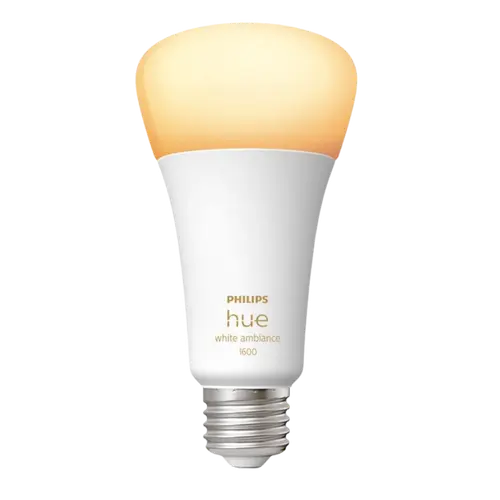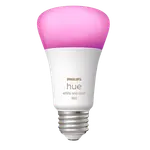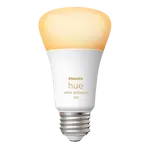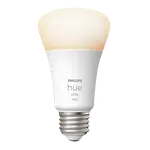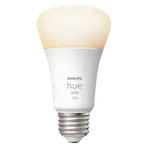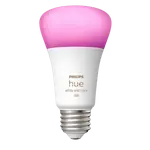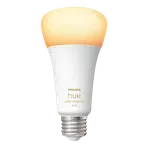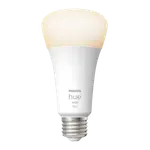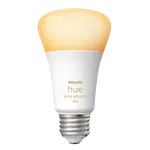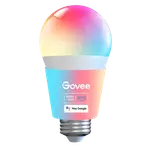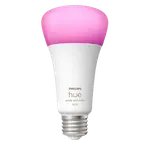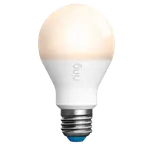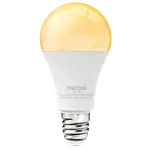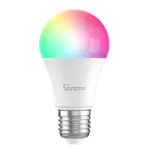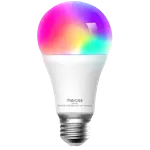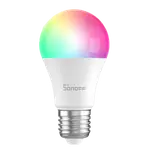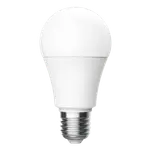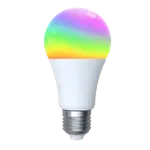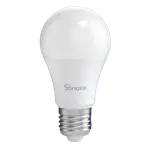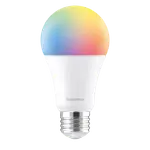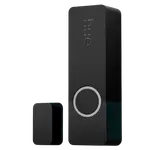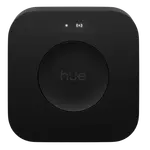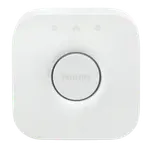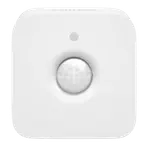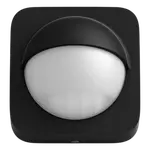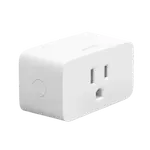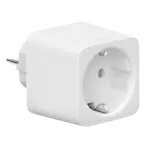Philips
Hue Smart Bulb - White Ambiance 1600
Summary
Connectivity: Bluetooth, Zigbee (Zigbee Hub required)
Integrations: Google Home, Alexa, Apple HomeKit, Samsung SmartThings, Home Assistant, IFTTT
Features: Power Off Memory, Color Temperature (2000-6500K), Maximum Brightness (1100lm), Adjustable Brightness, Adjustable Transition, Dynamic Scenes, Zibgee Router
Price History
Loading price history...
| Brand | Philips |
|---|---|
| Headquarters | |
| Website | https://www.philips-hue.com |
| @tweethue |
Connectivity
Range: The 2.4 GHz band offers a longer range, meaning it can cover larger areas and penetrate solid objects like walls more effectively than 5 GHz.
Speed: Generally, 2.4 GHz provides slower speeds compared to 5 GHz due to a lower maximum data rate.
Interference: More prone to interference since many other devices (like cordless phones, microwaves, and Bluetooth devices) operate on the 2.4 GHz frequency, leading to potential congestion and slower network performance.
NO
Range: Offers a shorter range compared to 2.4 GHz and may have difficulty penetrating walls and other obstacles.
Speed: Typically provides faster speeds and higher data rates due to more available bandwidth.
Interference: Less prone to interference as fewer devices operate on this frequency, leading to a more stable connection.
NO
Bluetooth is a wireless communication technology used for exchanging data over short distances.
Bluetooth enables devices to communicate wirelessly within a short range, typically up to 10 meters (about 33 feet) for most consumer devices.
YES
Z-Wave is known for its low power consumption, making it ideal for battery-powered devices. It supports a mesh networking topology, allowing devices to communicate with each other directly or through intermediary nodes, thus extending the overall network range and enhancing reliability. The protocol supports data rates of up to 100 kbps, suitable for transmitting control commands and sensor data.
NO
Zigbee is a wireless communication protocol designed for low-power, short-range applications, commonly used in smart home devices, industrial automation, and other areas requiring reliable, low-data rate communication. It features low power consumption, making it ideal for battery-operated devices, and supports short-range communication, typically up to 100 meters. Zigbee employs mesh networking, allowing devices to relay data through each other to extend range and improve reliability. It supports data rates up to 250 kbps, suitable for small data packets, and ensures interoperability among devices from different manufacturers if they conform to Zigbee standards. Security is robust, with AES-128 encryption for data protection.
Zigbee devices need a Zigbee-compatible hub to connect and communicate with other devices in your smart home setup.
Zigbee Hub required
Thread is a wireless communication protocol designed specifically for Internet of Things (IoT) devices, providing secure, reliable, and scalable networking. Unlike some other protocols, Thread is IP-based, which means it can seamlessly integrate with existing internet infrastructure. It operates in the 2.4 GHz frequency band and uses mesh networking to enhance reliability and extend range by allowing devices to relay data through each other.
Thread is optimized for low power consumption, making it suitable for battery-operated devices. It supports low-latency communication, which is crucial for real-time applications like home automation and security systems. The protocol ensures high security with AES-128 encryption and end-to-end security at the network layer. Thread also supports over-the-air updates, ensuring devices can stay up to date with the latest features and security patches.
Thread-enabled devices require a Thread Border Router (such as certain smart home hubs or routers) to connect to your home network and other Thread devices.
NO
Additional connectivity options not covered by the standard protocols.
This may include proprietary wireless protocols, infrared, or other specialized communication methods.
NO
Integrations
Google Home serves as a central hub for a variety of smart devices, including lights, thermostats, cameras, and speakers. It leverages Google Assistant for voice control, enabling users to manage their smart home with simple commands.
YES
Amazon Alexa is one of the most widely used smart home systems, known for its compatibility with a vast array of devices. Users can control everything from smart lights to appliances using voice commands through Echo devices.
YES
Apple HomeKit is designed for users in the Apple ecosystem, providing a seamless way to control compatible smart devices through iOS devices using the Home app or Siri. It emphasizes security and user privacy.
YES
SmartThings is a flexible platform that connects a wide range of devices from different brands, offering a unified interface for control. It supports various communication protocols, allowing for extensive device compatibility.
YES
Home Assistant is an open-source platform that allows for extensive customization and integration of a wide variety of smart devices. It supports a multitude of protocols and brands, making it ideal for tech-savvy users.
YES
IFTTT (If This Then That) is a web-based service that allows users to create simple automation sequences, known as applets, which enable different devices, services, and applications to work together seamlessly. It connects a wide range of products and services, facilitating interoperability and enhancing functionality.
YES
Matter is a unified, open-source connectivity protocol designed to standardize and simplify communication between smart home devices from different manufacturers. Developed by the Connectivity Standards Alliance (formerly the Zigbee Alliance), Matter aims to improve interoperability, security, and reliability across various smart home ecosystems.
Matter operates over existing networking technologies, including Ethernet, Wi-Fi, and Thread, providing flexibility in device connectivity. Its IP-based nature allows seamless integration with existing internet infrastructure and cloud services. Matter uses a mesh networking topology, particularly when operating over Thread, to enhance range and reliability by allowing devices to relay data through each other.
Security is a cornerstone of Matter, with end-to-end encryption and secure device onboarding processes ensuring robust protection for data and privacy. Matter also supports over-the-air updates, allowing devices to stay current with the latest features and security enhancements.
NO
Power
Operating voltage requirement of the LED bulb.
Voltage compatibility ensures the bulb will work safely with your home's electrical system.
110-130V
Power consumption in LED bulbs refers to the amount of electrical energy the bulb uses to produce light, measured in watts (W).
16W
Electric current draw of the LED bulb during operation.
Current specifications help determine electrical load and compatibility with dimmer switches.
?
Operating frequency of the LED bulb's power supply.
Frequency compatibility ensures proper operation with your region's electrical grid (50Hz or 60Hz).
?
The Power Factor (PF) is a measure of how efficiently an electrical device, such as an LED bulb, uses the electricity it receives. It is expressed as a number between 0 and 1, or sometimes as a percentage. The closer the Power Factor is to 1, the more efficiently the device is using the energy. A high Power Factor means that almost all the power drawn from the grid is being used for useful work (like producing light), whereas a low Power Factor means that some energy is being wasted.
0.9
The type of base or connector used to attach the bulb to the fixture.
Interface type (like E26, E27, GU10) determines which fixtures the bulb will fit in your home.
E26
Features
Support to configure whether you want the light to turn on or off automatically after a power outage.
YES
The range of colors the LED bulb can produce.
Color-changing capability allows you to create different moods and atmospheres for various occasions.
NO
The color temperature, measured in Kelvin (K), describes the visual warmth or coolness of the light it emits.
Here's a breakdown of typical LED color temperatures and their characteristics:
Warm White (2700K - 3000K):
- Color: Soft yellow or orange glow, similar to traditional incandescent bulbs.
- Feel: Cozy, relaxing, and inviting.
- Best For: Living rooms, bedrooms, dining areas, and other spaces where you want a warm, comfortable ambiance.
Neutral White or Cool White (3500K - 4100K)
- Color: Bright white with a hint of warmth, but more neutral.
- Feel: Crisp and clean, without feeling too harsh.
- Best For: Kitchens, bathrooms, or workspaces where clear, bright light is needed for tasks, but still maintaining some warmth.
Daylight (5000K - 6500K)
- Color: Bluish-white or very cool light, resembling natural daylight.
- Feel: Energizing, clear, and sharp.
- Best For: Offices, garages, workshops, and outdoor spaces where maximum visibility and a more stimulating light are desired.
2000-6500K
The Brightness is the intensity or amount of light emitted. It is typically measured in lumens (lm), not watts, as it was with older incandescent bulbs. The higher the lumens, the brighter the light.
1100lm
The ability to dim or brighten the LED bulb.
Brightness adjustment helps create appropriate lighting levels for different activities and times of day.
YES
Control over how quickly the bulb changes between different settings.
Transition control allows smooth, gradual changes rather than abrupt lighting shifts, creating more natural effects.
YES
Pre-programmed lighting effects that change automatically over time.
Dynamic scenes can simulate natural lighting changes, create party atmospheres, or provide security lighting patterns.
YES
Acts as a repeater to extend Zigbee network range and reliability.
Zigbee router functionality strengthens the mesh network by relaying signals between devices.
YES
The ability to create automated actions based on sensor readings or schedules.
Automations can trigger other smart devices, send notifications, or adjust settings without manual intervention.
YES
Compare smart LED bulbs by brightness, color temperature, connectivity, automations, protocol support, and platform integrations.
![Philips Hue Smart Bulb - White and Color 800]() Philips
PhilipsHue Smart Bulb - White and Color 800
![Philips Hue Smart Bulb - White Ambiance 1100]() Philips
PhilipsHue Smart Bulb - White Ambiance 1100
![Philips Hue Smart Bulb - White 800]() Philips
PhilipsHue Smart Bulb - White 800
![Philips Hue Smart Bulb - White 1100]() Philips
PhilipsHue Smart Bulb - White 1100
![Philips Hue Smart Bulb - White and Color 1100]() Philips
PhilipsHue Smart Bulb - White and Color 1100
![Philips Hue Smart Bulb - White Ambiance 1600]() Philips
PhilipsHue Smart Bulb - White Ambiance 1600
![Philips Hue Smart Bulb - White 1600]() Philips
PhilipsHue Smart Bulb - White 1600
![Philips Hue Smart Bulb - White Ambiance 800]() Philips
PhilipsHue Smart Bulb - White Ambiance 800
![Govee Smart RGBWW Light Bulb]() Govee Life
Govee LifeSmart RGBWW Light Bulb
![Philips Hue Smart Bulb - White and Color 1600]() Philips
PhilipsHue Smart Bulb - White and Color 1600
![Ring A19 Smart LED Bulb]() Ring
RingA19 Smart LED Bulb
![Meross Smart Wi-Fi LED Bulb with Dimmable Light]() Meross
MerossSmart Wi-Fi LED Bulb with Dimmable Light
![Sonoff Wi-Fi Smart LED Bulb - Color - A60]() Sonoff
SonoffWi-Fi Smart LED Bulb - Color - A60
![Meross Smart Wi-Fi LED Bulb]() Meross
MerossSmart Wi-Fi LED Bulb
![Sonoff Wi-Fi Smart LED Bulb - Color - A19]() Sonoff
SonoffWi-Fi Smart LED Bulb - Color - A19
![Aqara LED Bulb T1]() Aqara
AqaraLED Bulb T1
![Moes ZigBee Smart LED Light Bulb]() Moes
MoesZigBee Smart LED Light Bulb
![Sonoff Wi-Fi Smart LED Bulb - Warm & Cold]() Sonoff
SonoffWi-Fi Smart LED Bulb - Warm & Cold
![SwitchBot Color Bulb]() SwitchBot
SwitchBotColor Bulb
![Hue Secure Contact Sensor]() Philips
PhilipsHue Secure Contact Sensor
![Philips Hue Bridge Pro]() Philips
PhilipsHue Bridge Pro
![Philips Hue Bridge]() Philips
PhilipsHue Bridge
![Philips Hue Smart Bulb - White and Color 800]() Philips
PhilipsHue Smart Bulb - White and Color 800
![Philips Hue Smart Bulb - White Ambiance 1100]() Philips
PhilipsHue Smart Bulb - White Ambiance 1100
![Philips Hue Smart Bulb - White 800]() Philips
PhilipsHue Smart Bulb - White 800
![Philips Hue Smart Bulb - White 1100]() Philips
PhilipsHue Smart Bulb - White 1100
![Philips Hue Smart Bulb - White and Color 1100]() Philips
PhilipsHue Smart Bulb - White and Color 1100
![Philips Hue Smart Bulb - White Ambiance 1600]() Philips
PhilipsHue Smart Bulb - White Ambiance 1600
![Philips Hue Smart Bulb - White 1600]() Philips
PhilipsHue Smart Bulb - White 1600
![Philips Hue Smart Bulb - White Ambiance 800]() Philips
PhilipsHue Smart Bulb - White Ambiance 800
![Philips Hue Smart Bulb - White and Color 1600]() Philips
PhilipsHue Smart Bulb - White and Color 1600
![Philips Hue Motion Sensor]() Philips
PhilipsHue Motion Sensor
![Philips Hue Outdoor Sensor]() Philips
PhilipsHue Outdoor Sensor
![Philips Hue Smart plug (US)]() Philips
PhilipsHue Smart plug (US)
![Philips Hue Smart plug (EU)]() Philips
PhilipsHue Smart plug (EU)
![Philips Hue Smart Bulb - White and Color 800]() PhilipsHue Smart Bulb - White and Color 800
PhilipsHue Smart Bulb - White and Color 800![Philips Hue Smart Bulb - White Ambiance 1100]() PhilipsHue Smart Bulb - White Ambiance 1100
PhilipsHue Smart Bulb - White Ambiance 1100![Philips Hue Smart Bulb - White and Color 1100]() PhilipsHue Smart Bulb - White and Color 1100
PhilipsHue Smart Bulb - White and Color 1100![Philips Hue Smart Bulb - White Ambiance 800]() PhilipsHue Smart Bulb - White Ambiance 800
PhilipsHue Smart Bulb - White Ambiance 800![Philips Hue Smart Bulb - White and Color 1600]() PhilipsHue Smart Bulb - White and Color 1600
PhilipsHue Smart Bulb - White and Color 1600![Aqara LED Bulb T1]() AqaraLED Bulb T1
AqaraLED Bulb T1![Philips Hue Smart Bulb - White 800]() PhilipsHue Smart Bulb - White 800
PhilipsHue Smart Bulb - White 800![Philips Hue Smart Bulb - White 1100]() PhilipsHue Smart Bulb - White 1100
PhilipsHue Smart Bulb - White 1100![Philips Hue Smart Bulb - White 1600]() PhilipsHue Smart Bulb - White 1600
PhilipsHue Smart Bulb - White 1600![SwitchBot Color Bulb]() SwitchBotColor Bulb
SwitchBotColor Bulb![Moes ZigBee Smart LED Light Bulb]() MoesZigBee Smart LED Light Bulb
MoesZigBee Smart LED Light Bulb![Govee Smart RGBWW Light Bulb]() Govee LifeSmart RGBWW Light Bulb
Govee LifeSmart RGBWW Light Bulb![Meross Smart Wi-Fi LED Bulb with Dimmable Light]() MerossSmart Wi-Fi LED Bulb with Dimmable Light
MerossSmart Wi-Fi LED Bulb with Dimmable Light![Meross Smart Wi-Fi LED Bulb]() MerossSmart Wi-Fi LED Bulb
MerossSmart Wi-Fi LED Bulb![Sonoff Wi-Fi Smart LED Bulb - Color - A60]() SonoffWi-Fi Smart LED Bulb - Color - A60
SonoffWi-Fi Smart LED Bulb - Color - A60![Sonoff Wi-Fi Smart LED Bulb - Color - A19]() SonoffWi-Fi Smart LED Bulb - Color - A19
SonoffWi-Fi Smart LED Bulb - Color - A19

